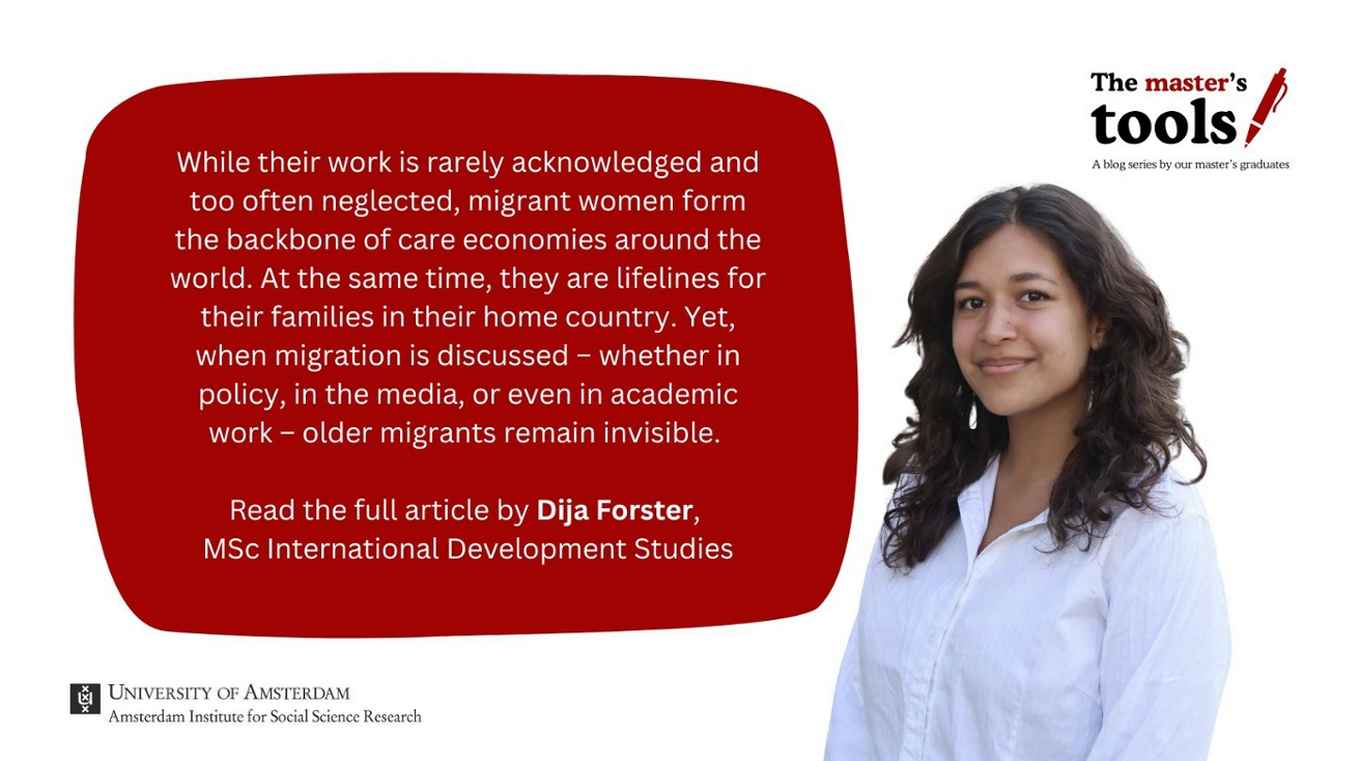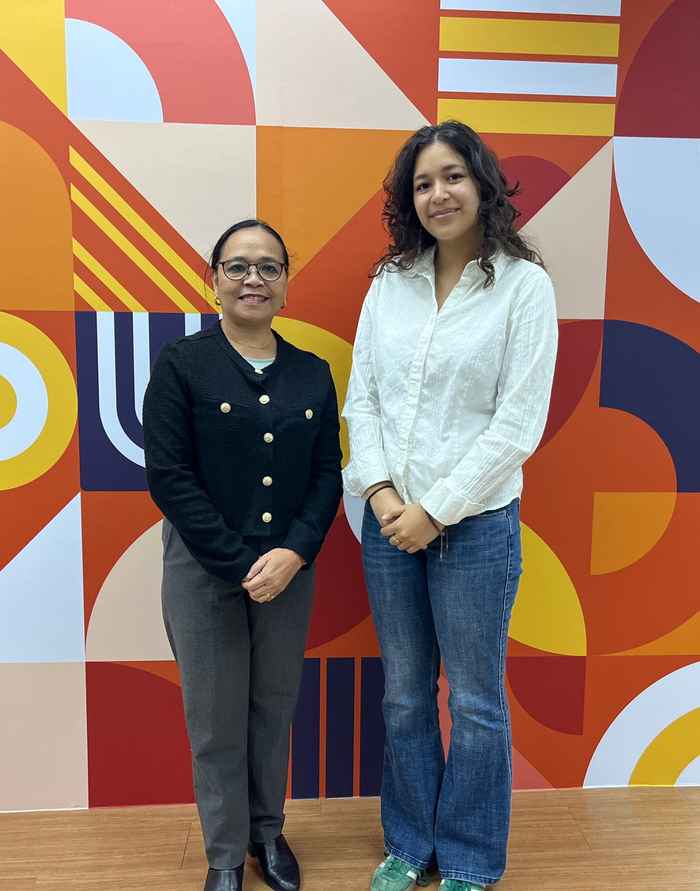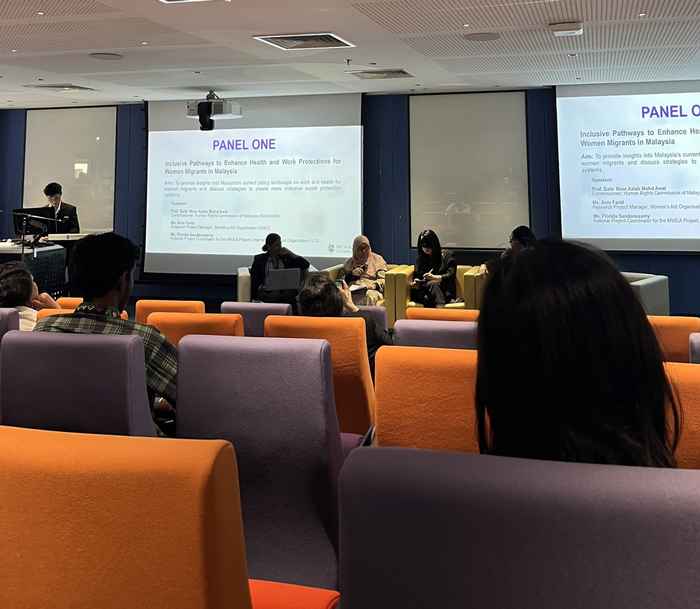She cared for us – Who cares for her?
The Case of Aging Migrant Domestic Workers in Malaysia
10 September 2025
For me… as long as Malaysia still wants me
Her words are just one of many shared by aging migrant domestic workers. These words carry with them names, faces, stories, and families. Caught between belonging and disposability, I ask: What happens when Malaysia no longer wants you?

Migrant Domestic Work in Malaysia
Malaysia is home to an estimated 300,000 to 400,000 domestic workers, most of them migrants from Indonesia and the Philippines. By law, they must be women between 21 and 45 years old, and they live in the homes of their employers. Day after day, they cook, clean, and care for children or elderly family members, their lives intertwined with those they work for. But because their visa is tied to their job, losing employment also means losing the right to remain in the country. These close, daily connections between employer and worker are therefore complicated, with the employer holding the power to decide not just the work but also whether the worker can continue to live in Malaysia.

While their work is rarely acknowledged and too often neglected, migrant women form the backbone of care economies around the world. At the same time, they are lifelines for their families in their home country. Yet, when migration is discussed – whether in policy, in the media, or even in academic work – older migrants remain invisible. This quiet ageism shapes how migration is understood. States and public conversation tend to care about migrants only in economic terms: How much do they contribute to national development? Do they benefit the job market? Rarely do we ever ask about the migrant’s own growth, well-being, or future beyond their ability to work. That, to me, is exactly the problem.
And so began my research, following the lives of migrant domestic workers and hearing their stories. I wanted to show them not as temporary laborers, but as women who age, who dream, and who deserve dignity and care as they grow older.
The Hidden Challenges of Aging
Getting older as a domestic worker is actually not easy
Sundays are mandatory rest days for migrant domestic workers. In Kuala Lumpur, I spent many of these days in a small, intensely air-conditioned room, sitting with women from the Philippines and Indonesia. We talked about their lives, shared laughter, and I listened to the worries and hopes they carried with them.
Part of life as a migrant worker in Malaysia involves annual health checks that decide whether they can keep their work permits. Failing these checks, however, can mean deportation. As these women grow older, the physical demands of their jobs, including lifting, cleaning, and standing for long hours, often lead to heightened pain and fatigue. For older workers, these exams are a growing source of anxiety, as their health determines not only whether they can keep working in Malaysia but also whether they can support their families back home. The migrant domestic worker’s body carries the weight of both her work and her family’s livelihood, so taking care of herself is no longer just for her own well-being but for everyone who depends on her.
After the age of 45, the stakes become even higher. Migrant domestic workers can no longer change employers, so staying in Malaysia depends entirely on whether their current employer renews their permit and whether they pass the mandatory health checks. Unexpected events such as an employer retiring, falling ill, dying, or deciding to terminate employment can abruptly force a worker to leave the country, often with little time to prepare financially or emotionally for the return home. Sofia (59), was due to return home just two weeks after our conversations because her employer had passed away. When I asked if she would have stayed if she could, she said simply,
Yeah, I can still work! But I have no choice, really. I need to go back.
Beyond this, the age restriction also increases their vulnerability to exploitation. Jaya (45), told me that her employer was supposed to pay her 2,500 RM (€520) each month, but she was only receiving 1,800 RM (€375). Now, she fears reporting it to the authorities. At her age, she can no longer switch employers, and speaking up could mean losing her job and, with it, her chance to stay in Malaysia. Unfortunately, what happened to Jaya is not an isolated case. Relying on the employer for a work permit reinforces the unequal power hierarchy between employer and domestic worker, trapping them in harmful situations.
Financial Uncertainty and Moral Obligations
For many aging migrant domestic workers, the greatest fear is going home and being seen as a burden once they can no longer earn. When their income stops, they may have to rely on their families for support – sometimes it comes, other times it does not, leaving them to get by on their own. Saving for their own future is rarely simple. Gendered and moral expectations weigh heavily, making it hard to put themselves first. As daughters, mothers, sisters, and grandmothers, they are often expected to meet the needs of their families back home, whether by paying school fees, covering medical bills, or caring for aging parents. For a woman far from home, saying no is not easy, and putting her own needs first can feel selfish, even impossible.

Many find informal ways to set aside money for the future, but these methods are often unstable and may not be enough for older age. With limited access to formal pension schemes, a sudden job loss can strip them of both their income and any safety net, imposing a constant worry about how they will survive if they must stop working or return home before they are ready.
Resilience, Collective Care, and the Call for Systemic Support
Yet these challenges do not define them. The women I met were not only navigating hardship but also demonstrating remarkable ingenuity in caring for themselves and one another. The main goal of my fieldwork was not to frame them as passive victims, but to highlight their independence as active agents. I was equally struck by their resilience and the ways they tend to their own well-being. These women navigate, resist, and plan for their futures in remarkably creative ways.

During this research, I constantly found myself asking: who cares for the aging body when that very body cares for everyone else? Care comes in many forms – from laughter and solidarity among the women, from support offered by employers during illness, from family back home, and even from quiet acts of self-preservation. What this study shows is that aging migrant women are cared for, but not reliably, nor systemically. It is time for the system to care for her, with the same heart that she has long extended to others.
*To protect participants’ identities, all names used in this article are pseudonyms.